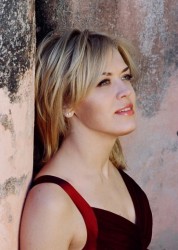 United Kingdom Sibelius, Rachmaninov and Prokofiev: Olga Kern (piano), Royal Scottish National Orchestra / Thomas Søndergård (conductor), Glasgow Royal Concert Hall, 23.3.2019. (GT)
United Kingdom Sibelius, Rachmaninov and Prokofiev: Olga Kern (piano), Royal Scottish National Orchestra / Thomas Søndergård (conductor), Glasgow Royal Concert Hall, 23.3.2019. (GT)

Sibelius – Symphony No.7 in C major, Op.105
Rachmaninov – Rhapsody on a Theme of Paganini, Op.43
Prokofiev – Symphony No.5 in B major, Op.100
This was the last concert prior to the RSNO’s second US tour in a year, programming works which they will be playing in Arizona and California. The pieces are firmly part of their repertoire and have been successfully recorded by them and offering an attractive blend of twentieth-century late romantic music all composed in a twenty-year period between 1924 and 1944.
Opening with Sibelius’s final Seventh Symphony allowed Glasgow audiences to compare this orchestra’s reading with that given by the Scottish Chamber Orchestra just last week (review click here). From the auspicious opening, it was clear this was going to be a solid performance under the Danish conductor, Thomas Søndergård. The main idea was announced by the beautiful entry from Dávur Juul Magnussen’s trombone, and the strings’ invocation seemed as a boat emerging from a sea mist, embellished by a delightful idea from the flute of Katherine Bryan, leading to a grand mood of expectancy. The violas offered steadiness and reliability in their deeply nuanced harmony and leading towards a glorious moment on the brass. However, the accompanying strings were here somewhat slack, and a degree of momentum from the opening was lost; the woodwind nevertheless retained their fluency with notably fine playing from David Hubbard’s bassoon. Søndergård’s handling of dynamics was exceptionally fine and he masterfully shaped the chilling ending.
The Russian/American pianist Olga Kern boasts a remarkable relationship with Russia’s greatest composers Rachmaninov and Tchaikovsky and is a gold medal-winner of the prestigious Van Cliburn Piano Competition and this was her second appearance with the orchestra. She certainly posed a glamorous figure on stage with her beautiful red gown and as soon as she touched the keyboard for some very familiar Rachmaninov, it was startingly obvious why she is so highly regarded in the United States and elsewhere. The idiom was suddenly quite different from the previous piece, for excitement and great flair was before us in the stunning combination between orchestra and soloist. This was an astonishing display from Kern in her technique and artistry, the strings played as one and sounded fantastic in colour and tone. There was a feeling of complete empathy between conductor and pianist and it was clear that they were listening to each other as each variation succeeded the other. Olga Kern has a fragile frame, yet she matches power and passion in her playing. Her brilliance was equalled by a fine contribution from Maya Iwabuchi on the solo violin, and the famous variation was spellbinding, sounding, as ever, fresh and invigorating. This was probably the best piano work performed here all season and serves as a tremendous send-off for the orchestra’s US tour with Kern later this month.
The Prokofiev Fifth has been in this orchestra’s repertoire for decades and they have made two recordings – the first with Alexander Gibson in the sixties for Waverley – and the second – a celebrated issue for Chandos with Neeme Järvi as part of their cycle of the symphonies in the eighties. However, on this occasion, disappointingly, this was not their best performance of this great work. Despite the fine opening dominated by vibrant playing from the brass, and good solo contributions from the wind and percussion, there was a lack of cohesion in the two central movements. Certainly, in the closing bars of the Andante, there was a terrifying image of the war reminding us when this was written. In the scherzo, there was persuasive string playing, and fine intonation from the oboe of Adrian Wilson and the bassoon of Hubbard. In the Adagio, again fine woodwind playing, but the dynamics of the playing was loose especially in the transition between the faster passages and it was difficult for the powerful themes to emerge. In the Allegro giocoso, the flute of Bryan was again superb and the tuba playing with the viola section excellent, and the start to the upbeat and exciting final culmination was tremendously executed.
Gregor Tassie

Good review BUT what a shame that there are still people out there spelling Rachmaninoff with a ‘v’ which is against the specific wishes of the composer.
It is spelt with a ‘FF’ on his grave so this should over-ride any other spellings.
We don’t say Gustav von Holst or use the German spelling for Handel, so why should Rachmaninoff be different.
Please, can we have a bit more respect for the wishes of this great composer?
We do our best but please forgive us if we cannot please everyone all the time I prefer ff but v may slip through from time to time even though there is great inconsistency about the spelling throughout all references to the composer. Another I have trouble with is whether it is Musorgsky or Mussorgsky. More importantly I am glad you liked the review. S&H